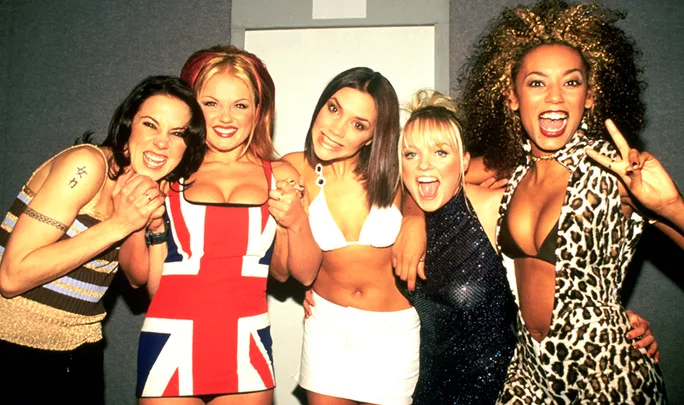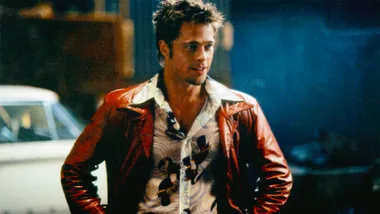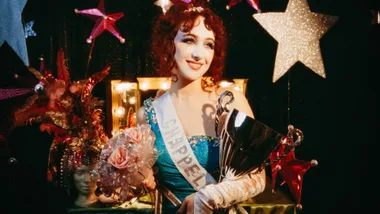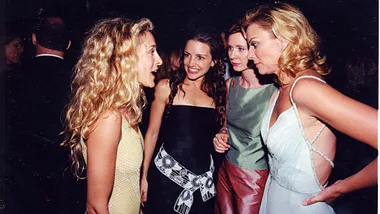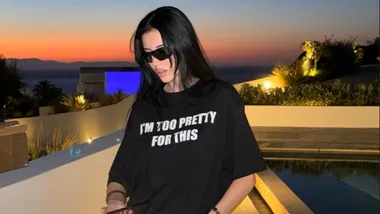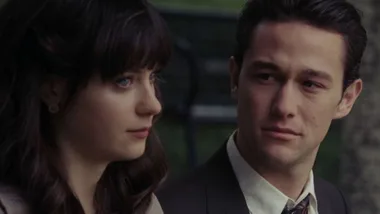Dust off your platform sneakers and unfurl your Union Jacks: on this day 20 years ago, the Spice Girls burst onto the scene – all big hair, body glitter and unashamed bubblegum pop.
It was 1996 – the peak of the grungy, male-dominated Britpop movement – and here stood/squealed/high-kicked five unknown 20-something women willing the world to “zig-a-zig-ah” to their earworm debut, “Wannabe”, and devour their rousing message of Girl Power.
The single sold more than 7 million copies and the fivesome were catapulted to global stardom. But the Girl Power philosophy? It was contentious from the start: while fan-girls (and boys) delighted in the empowering ethos, critics were quick to denounce it as a packaged, watered-down form of feminism.
Fast-forward 20 years and the “Wannabe” video has been remade by a new generation of female artists in a campaign to push UN global goals for women. Beyoncé sings about ladies running the world, and Kesha has spoken out about sexual abuse in the music industry. Feminism is more entwined with pop culture than ever before. The question is, do we have the Spice Girls to thank?
Let me speak from personal experience for a moment. I was 11 years old when I first spied the boisterous band on Saturday morning’s Video Hits, and while their catchy tunes and sparkly ensembles may have hooked me in, it was their tales of sisterhood and “girls rule” attitude that kept me going back for more.
Their message was simple: female friendship is everything (as the “Wannabe” chorus goes: “If you wanna be my lover, you gotta get* with my friends”). *go on, have a laugh – you know that’s not what they mean. They were the original #girlsquad, sans the smug selfies and supermodels-only entry policy.
Sisters came before misters, but the Spice Girls weren’t afraid of boys. Here were five young women standing on their own buffalo-boot-clad feet; mega-fans will recall the day they walked out on their controlling (male) management to conquer the world on their own.
And while they cheekily teased their male interviewers and made Prince Charles blush by planting big red smackers on his cheeks, they were far from defined by their relations with men. We never saw pap shots of them hooking up with floppy-haired boy band members or high-flying sport stars (well, until Posh met Becks – but they kept their early romance quieter than a silent movie. Take note, Swiddleston).
Man-hating, bra-burning feminists these girls were not – yes, you could wear your baby-doll dress and still be a strong, independent woman. But Adidas trackies worked equally well.
And even the sexier members of the group – Victoria with her leather catsuits, and Geri with her, ahem, ample assets – presented an image that was remarkably unsexualised. Unlike today’s generation of “empowered” nude-selfie-snapping stars, the Spice Girls’ feminist mantra had little to do with sexuality and the body.
Of course, the F word is always going to attract censure, especially when shouted by the most successful and commercialised girl group on planet pop.
For starters, the term Girl Power was originally coined by the Riot Grrrls, an early-’90s punk feminist movement. Their gripe? Team Spice had taken their rallying cry and turned it into a prettily packaged commodity, complete with Impulse deodorant and Chupa Chups. Exactly the kind of stuff the Riot Grrrls despised.
Feminist writers also condemned the band for promoting a light and frothy feminism deemed “Feminism Lite”, which detracted from the real issues of gender politics. According to author of How To Be A Woman Caitlin Moran, the Spice Girls were responsible for “wiping out feminism for a decade”. Their frivolous Girl Power rhetoric, she told The Guardian, simplified the women’s movement to having girlfriends and wearing short skirts.
But, isn’t any celebration of girls for being, well, girls, that puts feminism – light, heavy or accompanied by a wink and a peace sign – on the public agenda a good thing? And whether the group’s go-girls attitude was genuine or just a clever marketing ploy, it was the reality they projected.
The Spice Girls weren’t Gloria Steinem or Germaine Greer, nor did they pretend to be. But they offered me, and millions of others, a first taste of feminism – a sweet, palatable spoonful that helped shape me into the staunch supporter of women I am today. And maybe that’s the power of Girl Power.
